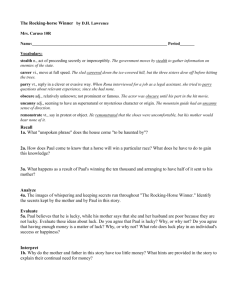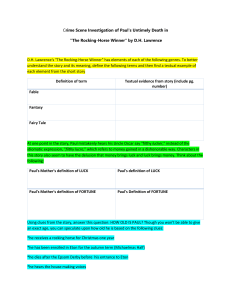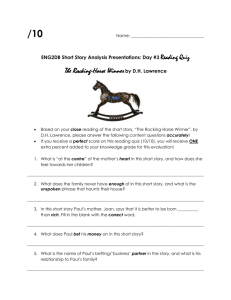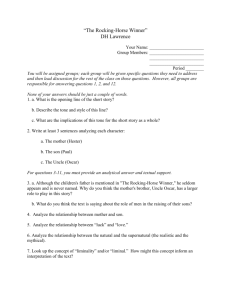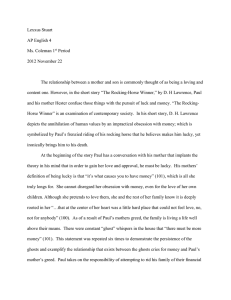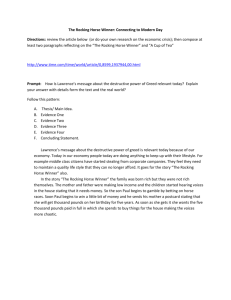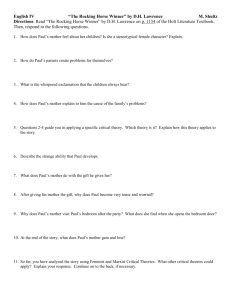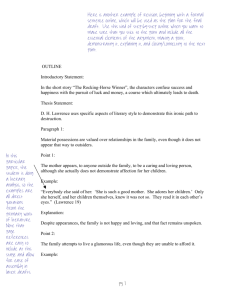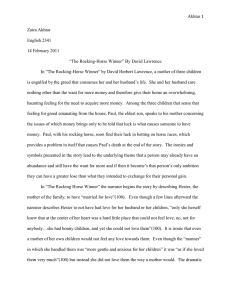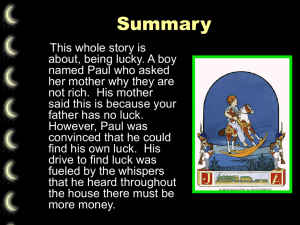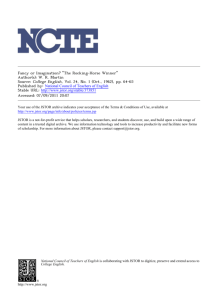The Rocking-Horse Winner ——D. H. Lawrence
advertisement
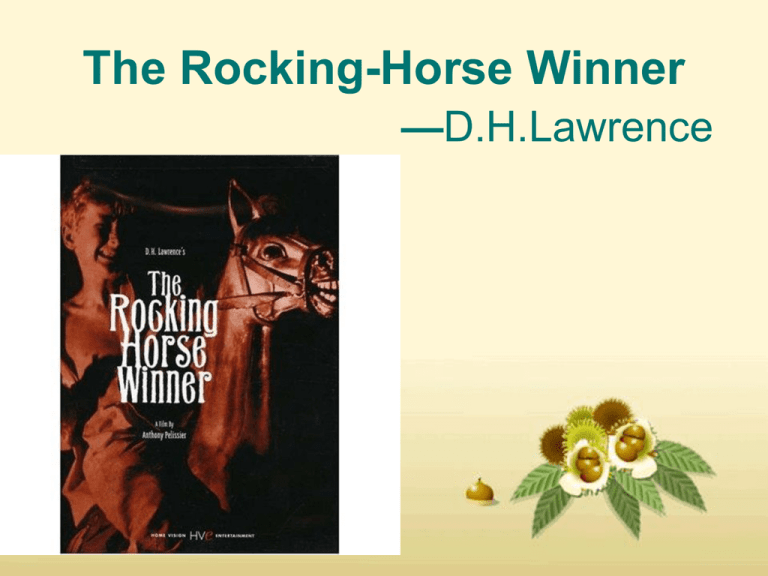
The Rocking-Horse Winner —D.H.Lawrence Introduction---background/setting plot Character - Analysis Style Theme Introduction "The Rocking-Horse Winner" is a short story by D. H. Lawrence. It was first published in July 1926 in Harper's Bazaar and subsequently appeared in the first volume of Lawrence's collected short stories. It was made into a film under the same title in 1950, directed by Anthony Pelissier and starring John Mills and Valerie Hobson. 木马赢家剧照 木马赢家剧照 Setting The setting is post industrial revolution England, and the story takes place during a period the Americans call ‘the roaring 20s, a time characterized by greed and a grasping materialism. The home of the family is a posh suburban English dwelling, maybe it is a rural part of England within reach of London. A young boy who notices that his mother doesn’t love him and his sisters。 Paul he rides the rocking-horse often and come to find that he can predict what horse is going to win the next big horse race 。 mother uncle Basset She becomes “dissatisfied with her marriage” when she finds that her husband is not lucky and doesn’t make enough money due to that fact 。 Provided the money that Paul used to make his first win at the horse race. Signed the lawyer papers。 Becomes partners with Paul and Basse The family gardener. Is the one who gets Paul into horse racing, and later becomes “betting partners” 。 Summary In "The Rocking-Horse Winner," a young boy, Paul, perceives that there is never enough money in his family, he sets out to find a way to get money through luck. He discovers that if he rides his rocking-horse fast enough, he will somehow "know" the name of the winning horse in the next race. He begins to make money and secretly give this money to his mother, but the desire for more money only grows more intense instead of going away. He finally rides his rocking horse so furiously in order to discover the winner of the Derby that he falls into illness and dies Characters Young Paul --- innocent, sensitive and intelligent. the mother --- a cold, unfeeling, grasping(greedy), materialistic woman disguised in the cover of a loving mother and wife; Characters the husband --- more or less a non-entity/never- do- well. English gardener ---he is passive, loyal, a little bit afraid of his superiors, and somewhat greedy to the extent Characters Uncle Oscar --- an unscrupulous [ʌn'skru:pjuləs]寡廉鲜耻的;不讲道德的 man who takes advantage of his nephew’s supernatural talents to his own advantage, without considering for a moment the pressures such activity may place upon the young boy. shallow and selfish. Style1 The opening paragraphs of story are written in a style is similar to that of a fairy tale. Instead of “once upon a time,” Lawrence begins with “There was a woman who was beautiful, who started with all the advantages, yet she had no luck.” This is a conscious attempt on the part of the author to use the traditional oral storytelling technique. Style2 This story also combines the supernatural elements of a fable, mainly Paul’s ability to “know” the winners just by riding his rocking horse, with the serious themes of an unhappy marriage and an unhealthy desire for wealth at all costs. The story begins with fable-like simplicity but ends with a serious message about wasted lives. themes Responsibility Generosity and Greed Oedipus Complex Responsibility The mother :“tried this thing and the other, obsession with Wealth and material items V.S but could not find anything successful.” When Paul gives his mother 5,000 pounds from his winnings, she spends all of it on material things, causing an even more urgent need for more money. The father: whose main talents are having expensive tastes and being handsome responsibilities of parenting the responsibility of the parents to provide for the children in a family the responsibility of the parents to spend money wisely and budget carefully Generosity and Greed Paul’s unselfish generosity--- Paul generously offers all his winnings to the family, in order to relieve the family and seems to have no needs of his own. Mother’s greed and selfishness. ---she has no idea where all this money is coming from and does not seem to care. she has become so obsessed with wealth that her heart turns completely to stone, so that she cannot even feel sad when her son dies. Oedipus Complex Paul’s desire to earn money for the family can be said to be an unconscious desire to take his father’s place, a concept that psychoanalyst [saikəu'ænəlist] Sigmund Freud termed the “Oedipus complex.” Questions Does " luck" mean money? How do you define it.
